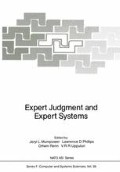Abstract
In this paper we evaluate the requirements for an expert system designed to exhibit creativity. First we consider what it means to be an expert and what “expert system” means in an artificial intelligence context. Then we shift focus from “ordinary” intelligence to “creative” intelligence by examining the concept of creative behavior, followed by a discussion of the implications for the design of an expert system exhibiting creativity across various domains. In the final section of the paper we present a design overview of such a system.
Access this chapter
Tax calculation will be finalised at checkout
Purchases are for personal use only
Preview
Unable to display preview. Download preview PDF.
References
Arieti, S., Creativity; the Magic Synthesis, New York: Basic Books, 1976.
Bouwman, M., “The use of accounting information: expert versus novice behavior”, in G. Ungson and D. Braunstein (eds.), Decision Making: An Interdisciplinary Inquiry, Boston: Kent, 1982.
Brooks, R., “Towards a theory of the comprehension of computer programs”, International Journal of Man-Machine Studies, 18, 1983, 543–554.
DeGroot, A.D., Thoughts and Choice in Chess, The Hague: Mouton, 1965.
Dewey, J., How We Think, New York: D.C. Heath, 1933.
Ernst, G.W., and A. Newell, GPS:A Case Study in Generality and Problem Solving, New York: Academic Press, 1969.
Feigenbaum, E., B. Buchanan, and J. Lederberg, “On generality and problem solving: a case study using the DENDRAL program”, in B. Meltzer and D. Michie (eds.), Machine Intelligence, 6, 1971, Edinburgh: Edinburgh university Press.
Fogler, S., “The design of a course in problem solving”, in J.T. Sears, D.R. Woods, and R.D. Noble (eds.), Problem Solving, AIChE Symposium Series, 79, 1983.
Goethe, J.W. v., Faust, by E. Trunz, (ed.), Munich: Beck, 1982.
Ghiselin, B. (ed.), The Creative Process, Berkeley, Ca: Univ. of Calif. Press, 1952.
Hayes-Roth, F., D.A. Waterman, and D.B. Lenat, Building Expert Systems, Reading, Ma.: Addison Wesley, 1983.
Humes, A., “Research on the composing process”, Review of Educational Research, 53, 1983, 201–216.
Kaufman, H., The Forest Ranger, Baltimore, Md.: Johns Hopkins Press, 1960.
Kolodner, J.L., “Towards an understanding of the role of experience in the evolution from novice to expert”, International Journal of Man-Machine Studies, 19, 1983, 497–518.
Langley, P., G.L. Bradshaw, and H.A. Simon, “BACON.5: the discovery of conservation laws”, Proceedings of the Seventh International Joint Conference on Artificial Intelligence, Vancouver, Canada, 1981.
Larkin, J., D. McDermott, D. Simon, H. Simon, “Expert and novice performance in solving physics problems”, Science, 208, 1980, 1335–1342.
MacCrimmon, K.R., “Elements of decision making”, in W. Goldberg (ed.)/ Behavioral Approaches to Modern Management, Sweden: BAS, 1970.
MacCrimmon, K.R. and C. Wagner, “A human-computer system for creative problem solving”, University of British Columbia working paper, 1987.
Nagel, E., The Structure of Science, New York: Harcourt, Brace and World, 1961.
Newell, A. C. Shaw, and H.A. Simon, “Elements of a theory of human problem solving”, Psychological Review, 65, 1958, 151–166.
Riesbeck, C.K., “Knowledge reorganization and reasoning style”, International Journal of Man-Machine Studies, 20, 1984, 45–61.
Sowa, J.F., Conceptual Structures: Information Processing in Mind and Machine, Reading, Ma.: Addison-Wesley, 1984.
Stein, M.I., Stimulating Creativity, New York: Academic Press, 1974.
Turing, A.M., “Computing machinery and intelligence”, Mind, 59, 1950, 433–460.
Vessey, I., “An investigation of the psychological processes underlying the debugging of computer programs”, Unpublished Ph.D. Thesis, Department of Commerce, University of Queensland, 1984.
Vitalari, N.P. and G.W. Dickson, “Problem solving for effective systems analysis: an experimental exploration”, Communications of the ACM, 26, 1983, 948–956.
Waterman, D.A., A Guide to Expert Systems, Reading, Ma.: Addison-Wesley, 1986.
Woods, D.R. “Problem solving and chemical engineering, 1981”, in J.T. Sears, D.R. Woods, and R.D. Noble (eds.), Problem Solving, AIChE Symposium Series, 79, 1983.
Author information
Authors and Affiliations
Editor information
Editors and Affiliations
Rights and permissions
Copyright information
© 1987 Springer-Verlag Berlin Heidelberg
About this paper
Cite this paper
MacCrimmon, K.R., Wagner, C. (1987). Expert Systems and Creativity. In: Mumpower, J.L., Renn, O., Phillips, L.D., Uppuluri, V.R.R. (eds) Expert Judgment and Expert Systems. NATO ASI Series, vol 35. Springer, Berlin, Heidelberg. https://doi.org/10.1007/978-3-642-86679-1_10
Download citation
DOI: https://doi.org/10.1007/978-3-642-86679-1_10
Publisher Name: Springer, Berlin, Heidelberg
Print ISBN: 978-3-642-86681-4
Online ISBN: 978-3-642-86679-1
eBook Packages: Springer Book Archive

